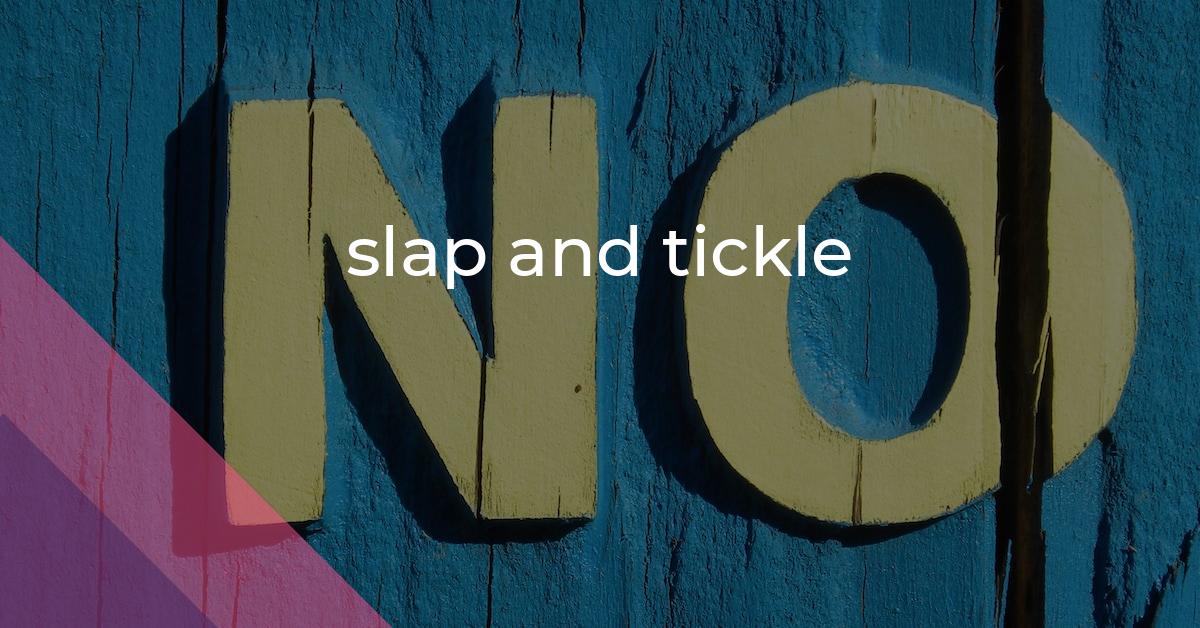slap and tickle: Idiom Meaning and Origin
What does ‘slap and tickle’ mean?
*slap and tickle* is an idiom referring to playful physical contact, often between romantic partners, characterized by light slapping or tickling. It typically suggests a flirtatious or affectionate interaction.

Idiom Explorer
The idiom "that's what she said" is a humorous phrase used to draw attention to statements that can be interpreted with a sexual innuendo or double entendre. It can be seen as a form of wordplay or a way to add a humorous twist to a conversation, often used in a lighthearted or joking manner.
The idiom *talk dirty* means to use explicit or vulgar language, often with sexual connotations, in conversation. It implies a form of communication that is inappropriate or offensive, particularly in formal or polite settings.
The idiom "take the piss" means to mock or make fun of someone or something, often in a light-hearted or teasing manner.
The idiom "take a joke" means to be able to accept and respond to humor or teasing in a lighthearted way, without becoming offended or angry.
The idiom "sweet nothings" refers to romantic, affectionate, or loving words that are considered trivial or meaningless. These words are often whispered softly, conveying intimacy between two people.
The idiom "suck face" refers to an intense or passionate kissing session between two people. It is often used informally and can imply a lack of discretion or restraint.
The idiom "stick it to" means to take revenge or get back at someone by giving them a difficult or unpleasant experience. It implies confronting and defeating someone in a confrontational or powerful manner.
The idiom "spank the monkey" is a colloquial expression that refers to the act of masturbating. It is considered vulgar and should be used cautiously in polite conversation.
The idiom "soft touch" refers to someone who is easily convinced, influenced, or taken advantage of due to their kind and trusting nature.
The Dance of Playful Affection
"slap someone around" and "slap leather" are two idioms related to the expression "slap and tickle." In the context of "slap someone around," the phrase is often used to describe physically assaulting or hitting someone, usually in a violent or aggressive manner. This idiom can be used figuratively to indicate exerting dominance or control over someone, often through force. On the other hand, "slap leather" is a phrase commonly associated with the Old West and cowboy culture. It refers to the act of drawing a gun from its holster quickly, usually in preparation for a shootout or self-defense. Now, let's dive deeper into the origins and usage of the expression 'slap and tickle'."
"Slap and tickle" is an idiomatic expression that originated in the United Kingdom and is primarily used in British English. This idiom is commonly used to describe affectionate or playful physical interaction, often between individuals in a romantic or sexual relationship. However, its meaning can also extend to include any kind of lighthearted or jovial physical contact between people, such as playful wrestling or tickling.
The origins of this idiom are unclear, as there are no definitive sources that pinpoint its exact beginnings. It is believed to have emerged in the late 19th or early 20th century, carrying connotations of playfulness and flirtation. The phrase "slap and tickle" emphasizes the combination of two distinct actions – "slap" representing a light, playful hit or tap, and "tickle" referring to a gentle, tickling sensation – both of which can elicit laughter and create a sense of intimacy.
This idiomatic expression has gained popularity and recognition within British English-speaking communities, becoming a recognizable phrase associated with playful or affectionate interactions. In British culture, "slap and tickle" is often used in a light-hearted manner to suggest flirtation or physical playfulness, particularly within intimate relationships or in social settings where humor and banter are prevalent.
It is worth noting that the usage of "slap and tickle" can vary in different contexts and among different individuals. While it is commonly used to describe consensual and lighthearted physical interactions, it is important to remember that not everyone may perceive or interpret such actions in the same way. Consent and awareness of personal boundaries are crucial to ensuring that any physical contact remains respectful and comfortable for all parties involved.
Although "slap and tickle" originated in the United Kingdom and is predominantly used in British English, it has become somewhat known and used in other English-speaking regions as well. However, its usage may be less prevalent outside of the UK and may not carry the same cultural connotations or familiarity.
The related idiom "slap someone around" takes a darker turn, as it suggests physically assaulting or hitting someone in a violent or aggressive manner. This phrase is often used figuratively to indicate exerting dominance or control over someone, often through force. While "slap and tickle" implies consensual and playful physical interactions, "slap someone around" denotes the opposite – non-consensual and aggressive behavior.
In contrast, the related idiom "slap leather" has a completely different connotation. It is a phrase commonly associated with the Old West and cowboy culture. "Slap leather" refers to the act of drawing a gun from its holster quickly, usually in preparation for a shootout or self-defense. This idiom captures the swift action and readiness associated with gunfights and the inherent danger of such situations.
The idiom "slap leather" is a stark contrast to the playful connotations of "slap and tickle." While "slap and tickle" represents intimacy, humor, and affection, "slap leather" signifies danger, confrontation, and the potential for violence. These two idioms serve as examples of how language can evoke vastly different emotions and images depending on the words and phrases used.
"slap and tickle" is an idiomatic expression originating from the United Kingdom and used primarily in British English. It describes affectionate, playful, and often flirtatious physical interactions between individuals. While its exact origins remain uncertain, the phrase has become associated with lighthearted physical playfulness and humor. However, it is important to consider individual boundaries and consent when engaging in any kind of physical contact. As with many idioms, this expression has cultural specificity and may not be as widely recognized or used outside of the UK.
Example usage
Examples of how the idiom *slap and tickle* can be used in a sentence:
- They were engaging in a playful slap and tickle, chasing each other around the room.
- The couple enjoyed a bit of slap and tickle before heading off to bed.
- During the party, there was lots of laughter and slap and tickle as everyone let loose and had a good time.
More "Intimacy" idioms
We missed the mark - nothing found.



